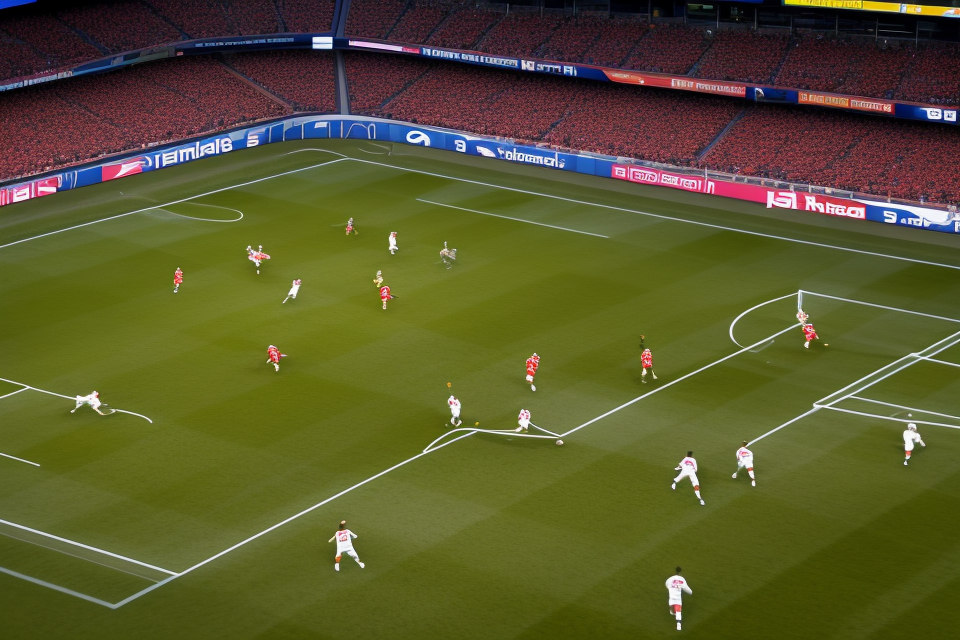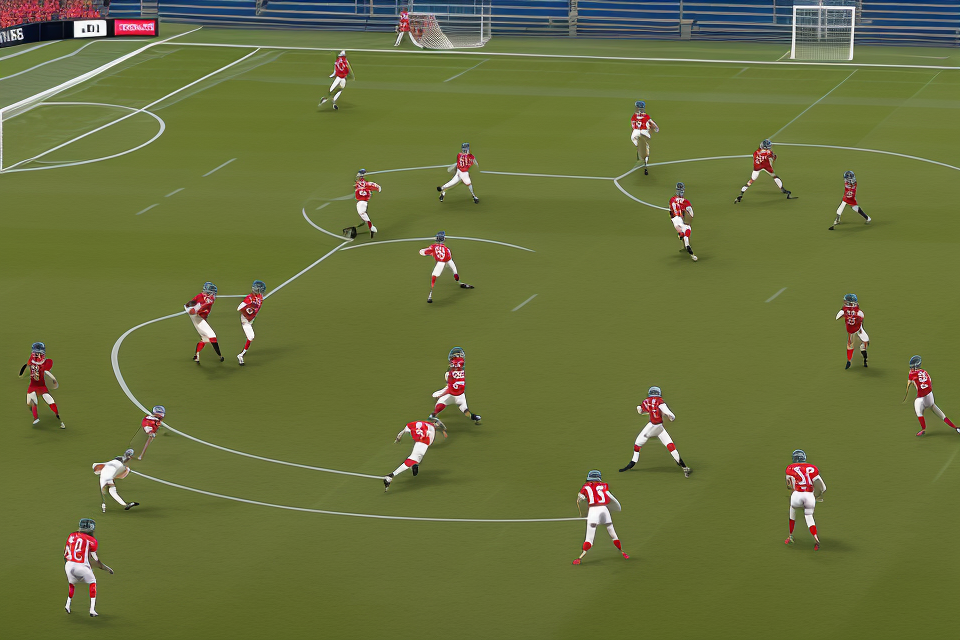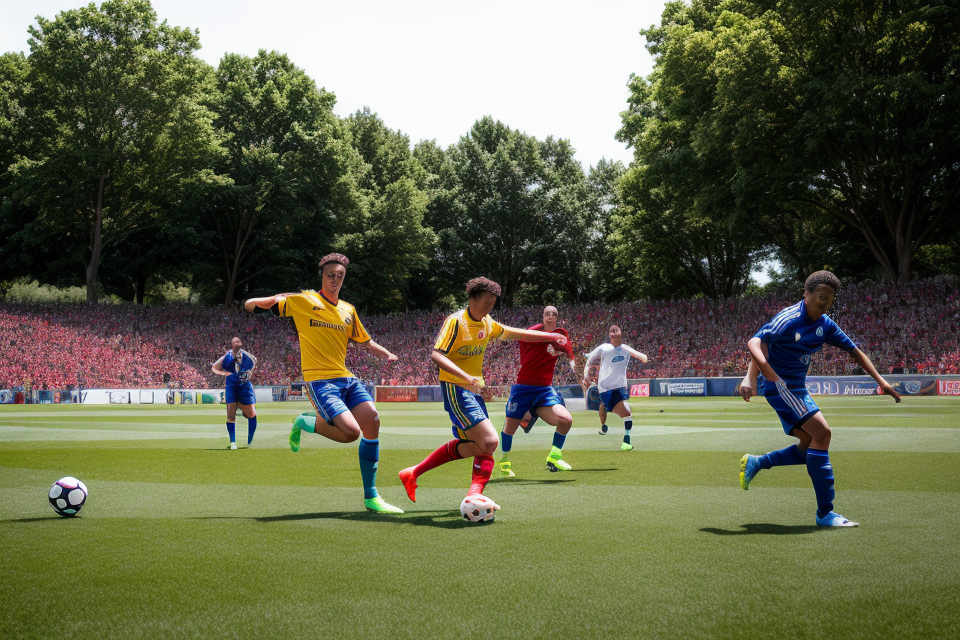Soccer is a sport that requires both physical and mental prowess. While physical training is essential, improving your soccer tactics is equally important. Whether you’re a beginner or an experienced player, there’s always room for improvement. In this article, we’ll explore some tips and techniques that can help you enhance your soccer tactics and boost your performance on the field. From understanding the game better to developing better passing skills, we’ll cover it all. So, let’s get started and take your soccer game to the next level!
Understanding Soccer Tactics
The Importance of Soccer Tactics
- Defining soccer tactics
Soccer tactics refer to the strategies and plans that teams employ during a match to achieve their objectives. These objectives may include scoring goals, defending against opponents, maintaining possession of the ball, or disrupting the opposing team’s rhythm. - How soccer tactics affect performance
Soccer tactics play a crucial role in determining a team’s performance on the field. Effective tactics can help a team dominate the game, create scoring opportunities, and limit the opposition’s chances. On the other hand, poor tactics can lead to disorganization, confusion, and a lack of cohesion among players, ultimately resulting in poor performance.
Understanding the importance of soccer tactics is essential for any player who wants to improve their performance on the field. By mastering the art of tactics, players can better anticipate their opponents’ moves, make more effective decisions, and ultimately contribute more to their team’s success. In the following sections, we will explore some of the key elements of soccer tactics and how players can develop their skills in this area.
Types of Soccer Tactics
In soccer, tactics refer to the specific strategies and plans that teams use to outmaneuver their opponents and achieve their objectives on the field. There are three main types of soccer tactics: offensive tactics, defensive tactics, and transition tactics.
- Offensive Tactics: Offensive tactics are used by teams to create scoring opportunities and put the ball in the back of the net. These tactics include formations such as the 4-4-2 or the 3-5-2, and strategies such as through-balls, wing play, and quick counter-attacks. Players who excel in offensive tactics are typically fast, skilled at dribbling, and have a strong understanding of spacing and positioning.
- Defensive Tactics: Defensive tactics are used by teams to prevent their opponents from scoring. These tactics include formations such as the 5-4-1 or the 3-6-1, and strategies such as marking, tackling, and clearing the ball. Players who excel in defensive tactics are typically fast, strong, and have excellent tackling and interception skills.
- Transition Tactics: Transition tactics are used by teams to transition from defense to offense and vice versa. These tactics include formations such as the 3-5-2 or the 4-3-3, and strategies such as pressing, counter-pressing, and maintaining possession. Players who excel in transition tactics are typically versatile, have good endurance, and are skilled at both defending and attacking.
In summary, understanding the different types of soccer tactics is crucial for any player looking to enhance their performance on the field. Whether you’re a forward, midfielder, defender, or goalkeeper, having a solid understanding of offensive, defensive, and transition tactics will help you make more informed decisions on the field and better contribute to your team’s overall success.
Improving Your Soccer Tactics
Analyzing Your Opponents
Scouting Your Opponents
One of the key aspects of analyzing your opponents is to scout them thoroughly. This involves gathering as much information as possible about their playing style, strengths, weaknesses, and tactics. You can do this by watching their previous matches, studying their formations, and identifying their key players.
Identifying Weaknesses and Strengths
Once you have gathered information about your opponents, it’s important to analyze it to identify their weaknesses and strengths. Look for patterns in their play, such as which players are most effective in certain situations, and which areas of the field they tend to be weak in. This information can help you develop a strategy to exploit their weaknesses and neutralize their strengths.
Additionally, you should also consider your own team’s strengths and weaknesses when developing your strategy. This will help you to create a balanced approach that takes into account both your own team’s capabilities and your opponent’s vulnerabilities.
Overall, analyzing your opponents is a crucial part of improving your soccer tactics and boosting your performance on the field. By gathering and analyzing information about your opponents, you can develop a strategy that takes into account their strengths and weaknesses, and use this to your advantage during the match.
Developing Your Game Plan
Setting goals
- Identifying specific, measurable, achievable, relevant, and time-bound (SMART) goals
- Aligning individual goals with team objectives
- Prioritizing short-term and long-term goals
Creating a strategy
- Analyzing the strengths and weaknesses of both the team and opponents
- Developing a flexible game plan that can adapt to changing circumstances
- Establishing clear communication channels among team members
Incorporating tactics
- Experimenting with different formations and positions
- Implementing effective ball possession and movement off the ball
- Utilizing set pieces and corner kicks to gain advantages
Conducting regular game simulations
- Rehearsing game scenarios and tactics in a controlled environment
- Evaluating team performance and identifying areas for improvement
- Adjusting the game plan based on feedback and results
Practicing and Training
Effective training is essential for enhancing your soccer tactics and improving your performance on the field. By practicing regularly and incorporating targeted drills, you can develop the skills and muscle memory necessary to execute complex tactics with precision and confidence. Here are some key aspects to consider when practicing and training to boost your soccer performance:
Drills to Improve Soccer Tactics
- Small-sided games: Participating in small-sided games, such as 3v3 or 4v4, can help you develop your tactical awareness and decision-making skills in a match-like environment. These games allow you to practice passing, movement, and positioning in a more focused and intense setting.
- Positional drills: Specific positional drills can help you hone your skills in different roles on the field, such as the center-back, winger, or attacking midfielder. These drills should focus on executing the key responsibilities and tactics associated with each position, helping you become more effective in those roles.
- Possession drills: Drills that emphasize maintaining possession and passing the ball in various situations can help you develop your team’s overall cohesion and effectiveness in building attacks. This can include exercises such as “possession drill” or “3v2” drills, where you practice maintaining control of the ball under pressure from the opposition.
Repetition and Muscle Memory
- Repetition: Repetition is key to developing muscle memory and mastering soccer tactics. By consistently practicing the same movements and techniques, you can build a strong neural connection in your brain, allowing you to execute the tactics automatically and with confidence.
- Muscle memory: Muscle memory is the ability of your muscles to remember the patterns and movements associated with a particular task. By repeatedly performing soccer tactics during training, you can develop muscle memory, which will enable you to execute the tactics without conscious thought during a match.
Training with a Team
- Teamwork: Training with a team is essential for developing your soccer tactics and improving your overall performance. Working together with your teammates allows you to practice communication, coordination, and positioning in a match-like environment.
- Team cohesion: Training sessions should emphasize teamwork and promote a sense of cohesion among teammates. This can help build trust and understanding among players, enabling them to work together more effectively on the field.
- Match simulation: Incorporating match simulations into training sessions can help you prepare for real-game scenarios and develop your tactical awareness in a high-pressure environment. This can include exercises such as small-sided games or full-field scrimmages, where you can practice executing tactics against an opposition.
Mental Preparation
In order to improve your soccer tactics and boost your performance on the field, it is essential to focus on mental preparation. This includes visualization techniques, building confidence, and staying focused during the game.
Visualization Techniques
Visualization techniques involve creating mental images of yourself performing well on the field. This can include visualizing yourself making successful tackles, scoring goals, or passing the ball to a teammate. By regularly practicing visualization techniques, you can train your mind to be more focused and confident during games.
Building Confidence
Confidence is a crucial aspect of sports performance. To build confidence, it is important to recognize your strengths and celebrate your successes. This can include acknowledging your successful tackles, passes, or shots on goal. Additionally, it is important to surround yourself with supportive teammates and coaches who can help build your confidence.
Staying Focused During the Game
Staying focused during the game can be challenging, especially during high-pressure situations. To maintain focus, it is important to have a pre-game routine that helps you get in the right mindset. This can include listening to music, visualizing your performance, or mentally rehearsing your game plan. Additionally, it is important to stay hydrated and well-fed before and during the game to maintain energy levels.
By focusing on mental preparation, you can improve your soccer tactics and boost your performance on the field. Visualization techniques, building confidence, and staying focused during the game are all key aspects of mental preparation that can help you achieve success on the field.
Applying Your Soccer Tactics
Communication on the Field
Effective communication on the field is crucial for success in soccer. Teamwork and coordination are essential to execute plays and strategies. Therefore, clear communication between teammates is vital to ensure that everyone is on the same page.
Communicating with Teammates
Communication between teammates should be clear and concise. Players should know their roles and responsibilities in each play and communicate with their teammates accordingly. For example, a player may indicate to their teammate that they are making a run down the field, or signal that they are open for a pass.
Giving and Receiving Instructions
Players should also be able to give and receive instructions on the field. This can include calling for a ball, indicating the location of an opponent, or giving instructions for a set piece. Players should be able to quickly and effectively communicate with their teammates to ensure that they are all working together towards a common goal.
Additionally, players should be able to recognize and respond to their teammates’ nonverbal cues, such as body language and eye contact. This can help to facilitate smooth communication and avoid misunderstandings on the field.
In conclusion, effective communication on the field is essential for success in soccer. Players should be able to communicate clearly and concisely with their teammates, giving and receiving instructions as needed. By developing strong communication skills, players can enhance their tactics and boost their performance on the field.
Adapting to Changing Situations
Reading the Game
Reading the game is a crucial aspect of adapting to changing situations in soccer. It involves paying attention to various factors that can impact the game’s outcome, such as the positioning of players, the momentum of the match, and the behavior of the opposition. By reading the game effectively, players can anticipate the moves of their opponents and make informed decisions on the field.
Making Quick Decisions
Making quick decisions is essential in soccer, as the game can change rapidly. Players must be able to process information quickly and make decisions on the fly. This requires excellent situational awareness, as well as the ability to assess the position of teammates and opponents.
One way to improve decision-making is to practice with small-sided games, which simulate the fast-paced nature of soccer. These games can help players develop their ability to read the game and make quick decisions, as well as improve their ball control and passing.
Adjusting Tactics as Needed
In addition to making quick decisions, players must also be able to adjust their tactics as needed. This means being flexible and adaptable, and being able to modify their approach based on the changing circumstances of the game.
For example, if a team is behind in the match, they may need to change their tactics to become more aggressive and attack-minded. Conversely, if a team is leading, they may need to adopt a more defensive approach to protect their lead.
Adjusting tactics also involves communication with teammates. Players must be able to convey their intentions and instructions clearly, and be receptive to feedback from their teammates. This requires strong leadership and a clear understanding of each player’s role within the team.
Overall, adapting to changing situations is a critical aspect of soccer tactics. By reading the game effectively, making quick decisions, and adjusting tactics as needed, players can enhance their performance on the field and help their team achieve success.
Evaluating Your Performance
Evaluating your performance is a crucial step in enhancing your soccer tactics and improving your performance on the field. Here are some key strategies for evaluating your performance:
- Reviewing game footage: One of the most effective ways to evaluate your performance is by reviewing game footage. This can help you identify patterns in your play, such as where you excel and where you need to improve. It can also help you see how you react to different situations on the field, such as losing the ball or making a mistake.
- Identifying areas for improvement: Once you have reviewed the game footage, it’s important to identify areas for improvement. This might include things like passing accuracy, ball control, or positioning on the field. Be specific and objective in your analysis, and focus on what you can realistically work on.
- Setting new goals: After you have identified areas for improvement, it’s time to set new goals. These goals should be specific, measurable, achievable, relevant, and time-bound (SMART). For example, if you want to improve your passing accuracy, you might set a goal to complete 80% of your short passes in the next game. Make sure your goals are challenging but realistic, and write them down to help you stay focused.
By following these strategies, you can effectively evaluate your performance and identify areas for improvement. This will help you develop a plan for enhancing your soccer tactics and boosting your performance on the field.
FAQs
1. What are some key soccer tactics that I should focus on improving?
1.1. The first key tactic to focus on is ball control. This involves being able to dribble, pass and shoot with precision and accuracy. Mastering ball control will help you maintain possession of the ball and make it easier to move around the field.
1.2. Another important tactic is positioning. Understanding the proper positioning of players on the field is crucial for effective team play. Pay attention to the movements of your teammates and opponents, and adjust your position accordingly.
1.3. Defensive tactics are also important. These include things like marking, tackling, and clearing the ball. By improving your defensive skills, you can help prevent the other team from scoring.
2. How can I improve my decision-making on the field?
2.1. One way to improve your decision-making is to watch and analyze games. Study the moves of the players and try to understand why they made certain decisions. This will help you develop a better understanding of the game and make better decisions yourself.
2.2. Another way to improve your decision-making is to practice playing different scenarios. For example, you can practice making a pass under pressure or dribbling through a crowd of players. This will help you become more comfortable with different situations and make better decisions in real games.
3. How can I improve my physical fitness for soccer?
3.1. There are many exercises that can help improve your physical fitness for soccer. These include things like running, interval training, and plyometrics. Make sure to incorporate exercises that target the muscles used in soccer, such as your legs, core, and upper body.
3.2. In addition to physical exercises, it’s important to focus on your nutrition. Eating a healthy, balanced diet will help you maintain energy and endurance during games. Make sure to fuel up with carbohydrates before games and eat a post-game meal that includes protein to help repair your muscles.
4. How can I improve my mental game in soccer?
4.1. Improving your mental game involves developing focus, confidence, and resilience. One way to do this is to practice visualization techniques. Close your eyes and imagine yourself successfully executing different plays on the field. This will help you build confidence and prepare mentally for games.
4.2. Another way to improve your mental game is to learn from your mistakes. Instead of getting discouraged after a mistake, use it as an opportunity to learn and improve. Focus on what you can control and let go of things that are outside of your control.
Do these SMALL changes and IMPROVE quickly!
https://www.youtube.com/watch?v=01fRSHG3w5k



